Live on the homepage now!
Reader Supported News
The situation might be merely crass if not for the shadow of violence hanging over it.
It wasn’t supposed to happen this way. For one thing, it wasn’t supposed to happen today. Trump himself had announced earlier this month that he expected to be “arrested” on March 21; on the basis of what information was never clear. For another, of all the ongoing investigations into Trump—and there are many—the Manhattan probe is one of the least legally and factually straightforward. And yet, as is so often the case with Trumpian matters, the most outlandish outcome has somehow managed to come true.
The case traces back to 2018 reporting by The Wall Street Journal that Trump’s lawyer Michael Cohen had orchestrated a series of payments to two women in the months leading up to the 2016 election, in order to prevent them from speaking publicly about their past sexual relationships with Trump. The scandal unfolded as an odd shadow of the at-the-time-ongoing investigation by Special Counsel Robert Mueller into Russian election interference in 2016. Both stories concerned behind-the-scenes efforts to clinch Trump the presidency, only where one involved Russia’s military intelligence agency, the other featured a former Playboy model and an adult-film star. In August 2018, Cohen pleaded guilty in federal court to charges of lying to Congress about Trump’s entanglement with Russia—and, on the same day, also admitted to campaign-finance violations related to his coordination of the payments. The argument by federal prosecutors was that the payouts to the two women constituted an unreported in-kind donation to the Trump campaign.
The path from that 2018 plea deal to today is a strange and winding one. The federal government eventually declined to bring charges against Trump; the Manhattan district attorney’s office picked up the investigation, indicting the Trump Organization and its chief financial officer on tax fraud but not Trump himself; then the hush-money probe seemingly went dead, to the vocal frustration of the prosecutor hired to pursue the case. Then, in January 2023, the investigation suddenly sprang to life again, with reports that a New York grand jury was hearing new witnesses.
The past few weeks have been a very Trumplike stew of sound and fury, involving little information but a great deal of punditry as onlookers struggled to understand what might be happening. And the next few days will likely look much the same: With the indictment sealed, it’s hard to say much new. Reportedly, District Attorney Alvin Bragg is negotiating with Trump’s team about the process of the New York arraignment. The charges will become public when Trump appears in court. Whatever comes of it, Trump will go down in history as the first president to be twice impeached, and the first to be indicted.
As Bragg’s office geared up for the indictment in recent weeks, some commentators voiced worries about the strength of any case against Trump on the hush-money issue. Among other things, why Bragg suddenly decided to pursue the case is not clear, which risks lending credence to Trump’s claims that he’s the victim of a political prosecution. Until the public sees the evidence against the former president, though, evaluating these concerns remains difficult.
But on the basis of what’s already been reported, it seems fair to say that this is not the case most people thought would lead to Trump’s first turn in a courtroom as a defendant. Special Counsel Jack Smith at the Department of Justice is continuing to investigate the former president’s role in the January 6 insurrection. In Fulton County, Georgia, District Attorney Fani Willis appears to be moving closer to seeking indictments over Trump’s effort to interfere in that state’s tallying of the 2020 presidential vote. Both of these cases speak immediately to Trump’s abuses of authority and his desire to seek power at all costs. The hush-money case isn’t entirely separate from those ugly aspects of Trump’s presence on the political stage: It did, after all, involve an effort to meddle in the process of an election, in this instance by denying the public the full scope of available information about the man it would soon elect to high office. But even so, the interference itself does seem a little less urgent—and less weighty—than his involvement in fomenting an insurrection.
There’s something very, well, Trumpy about this: He has a way of making everything sordid. Instead of a dramatic discussion about the meaning of accountability for a president who sought to overthrow the will of the voters to stay in power, we’re arguing about the dirty mechanics of hush-money payments to an adult-film star.
The situation might be merely crass if not for the shadow of violence hanging over it. After announcing that he expected to be indicted on March 21, Trump promised “death and destruction” in a post on his bespoke social-media site, Truth Social. Now he’s busy raging about the indictment as “AN ATTACK ON OUR COUNTRY THE LIKES OF WHICH HAS NEVER BEEN SEEN BEFORE” and “weaponizing our justice system to punish a political opponent.” The ongoing investigations into Trump’s potential responsibility for the insurrection are a reminder of just how serious this rhetoric can get.
READ MORE 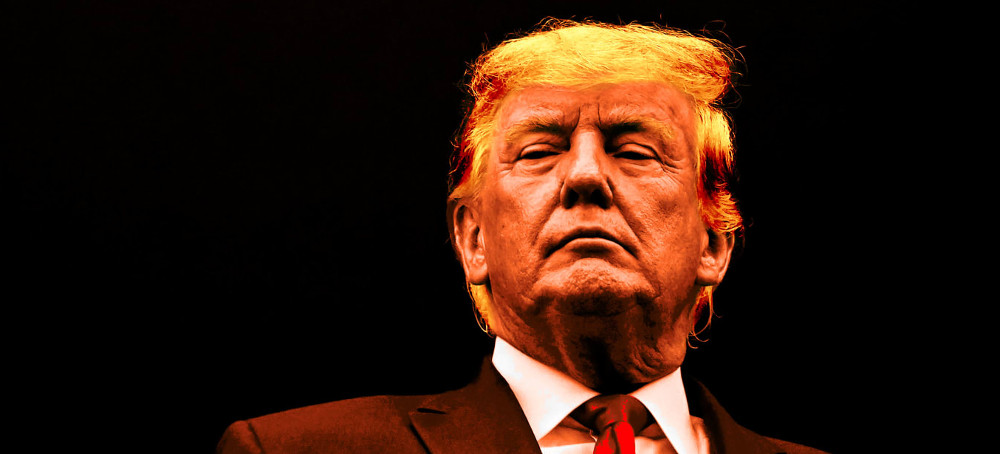 'It is purely morally satisfying that the ex-president - a vile, lifelong misogynist - is facing criminal charges.' (photo: Gaelen Morse/Reuters)
'It is purely morally satisfying that the ex-president - a vile, lifelong misogynist - is facing criminal charges.' (photo: Gaelen Morse/Reuters)
It is purely morally satisfying that the ex-president—a vile, lifelong misogynist—is facing criminal charges for essentially stepping on his own dick.
We don’t know the specific charges yet, but we can reasonably surmise it has something to do with Trump using 2016 campaign funds to pay for the silence of adult film actress Stormy Dianels (née Stephanie Clifford) with whom Trump allegedly had a sexual affair back in 2006. Trump’s then-attorney Michael Cohen took out a home equity loan of $130,000 in order to pay Daniels and was then reimbursed by the campaign. Which, to borrow law terminology, is super illegal.
The charges at the center of the New York state indictment pale in comparison to other laws Trump has allegedly violated or bragged about violating during his long tenure as a public figure. Trump is circling something like four drains right now.
A grand jury in Georgia also sounds poised to indict the former president on charges regarding his attempts to bully state election officials into falsifying 2020 electoral results, if statewide legislators’ attempts to jam up the case by firing the prosecutor don’t work out. Trump also must face a jury in a civil trial involving the writer E. Jean Carroll, who alleges that Trump defamed her when he called her a liar after she had accused him of sexually assaulting her in a New York City department store dressing room in the 1990s.
But Trump’s extensive resume of being a career shithead—a failed coup attempt, stiffing the contractors who built his hotels and casinos, two impeachments, numerous sexual misconduct and assault allegations, several near-misses with the IRS, stealing classified documents from the White House and storing him in the basement of his country club and lying about it, hiring his unqualified moron relatives and slimeball unregistered foreign agents for high-level government jobs, broadcasting his toilet thoughts to Sean Hannity and Tucker Carlson like they were Miss Cleo and he was paying 99 cents a minute for their psychic insight, and some light treason—it does feel fitting that this indictment is his first.
Trump allegedly had an extramarital affair back in 2006, while his wife was at home with their newborn son—trashy! Trump then tried to cover up that affair by having his attorney take out a home equity loan for $130,000—oh my god, what an asshole! And he reimbursed his bag man with campaign funds. (He or his surrogates have admitted to as much.) What a blithering moron!
Will Trump go to jail over this? Probably not. The statute of limitations has expired on the alleged crime at the center of the indictment. New York City court watchers are quick to point out that the Manhattan District Attorney’s office has some PR potholes to fill after former District Attorney Cy Vance whiffed several opportunities to prosecute Trump and members of his family.
Regardless, women who always found Trump to be a disgusting pig will likely find that today’s indictment adds richness and decadence to their mental state—like bacon fat instead of oil in a vinaigrette. Trump is a sexist asshole, perhaps the preeminent asshole in contemporary American life. That’s what his supporters love about him. That’s what regular people find distasteful about him. And it’s what most decent people loathe.
But Trump is, objectively, a pig of a man.
He’s been publicly, humiliatingly unfaithful to all three of his wives. One of his wives alleged that he physically and sexually abused her; she is now buried on his New Jersey golf course in what many observers say is a blatant attempt by Trump to save money on property taxes. Two dozen women have accused him of sexual abuse or misconduct. He’s made no secret of being sexually attracted to his oldest daughter. He used to pal around with the international sexual predator of children, Jeffrey Epstein. He famously barged into the changing area backstage of the Miss Teen USA pageant, back when he owned the pageant. He has literally bragged about sexually assaulting women.
Trump is a dick to everybody, but he’s mostly a dick to women, especially women who dare deviate from what he wants them to be. Women who are not sexually available or too sexually available, women who are too old, women who are too heavy or whose breasts are too small. Women who are too brunette or too indifferent to his personal preferences for how they should be or act. Women who are too Black, or too gay. Women who will not do his bidding. Women who are not completely malleable are not only worthless to Trump, they are scorned.
Being an asshole isn’t illegal, but every woman in America would probably think it was pretty great if the biggest asshole they knew went to jail.
And now, nearly two weeks after his Ides of March prediction, the closest thing living Americans have encountered to a self-proclaimed Caesar was metaphorically stabbed on the steps of the Senate by what he thought had always been his closest friend and ally—pussy.
It’s beautiful.
READ MORE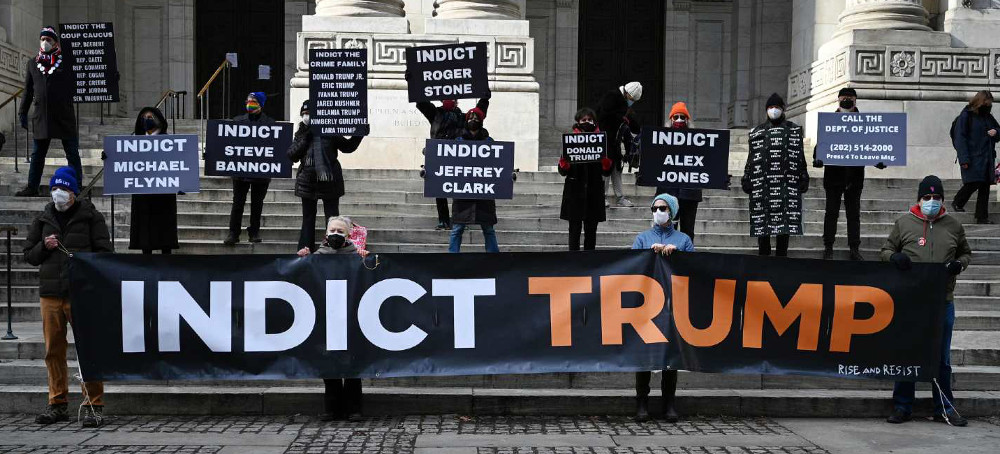 Protesters hold signs calling for the indictment of people connected with the January 6, 2021, attacks on the U.S. Capitol while gathered on the steps of the New York Public Library, New York, NY, January 6, 2022. (photo: Anthony Behar/AP)
Protesters hold signs calling for the indictment of people connected with the January 6, 2021, attacks on the U.S. Capitol while gathered on the steps of the New York Public Library, New York, NY, January 6, 2022. (photo: Anthony Behar/AP)
The fact that there is no choreographed political theater around the indictment is precisely how democracies tend to work: in a messy and piecemeal fashion
After all, Trump did not get indicted for his political crimes and misdemeanors. Other investigations may still catch up with him. But the fact that there is no choreographed political theater is precisely how democracies tend to work: messy, piecemeal, ensuring that there is no impunity.
Trump sycophants like Elise Stefanik and Andy Biggs complain that the country is becoming authoritarian and like “the third world”. Never mind the underlying racism of such pronouncements – the absence of spectacle proves that they are wrong, as does that fact that countries who fare far better on global democracy rankings than the US have not hesitated to go after former leaders for wrongdoing.
Former German president Christian Wulff was indicted on corruption charges – and cleared. Former French president Nicolas Sarkozy was indicted for bribing a judge and for campaign finance violations; he was convicted and sentenced to prison (his appeals are pending). Italian prime minister Silvio Berlusconi, a kind of Trump before Trump, was sentenced to four years in prison. In France, it would have once been unthinkable that a president – who, on one reading of the original, rather royalist conception of the Fifth Republic, embodies the country as a whole – could be treated like an ordinary criminal. But that is the point: the law cannot allow for exceptions; in both democracy and according to the rule of law, we are meant to be equals.
To be sure, it can easily seem like, in the end, there are different rules, and different punishments, for different people: Berlusconi never saw the inside of prison; for reasons of age, his sentence was commuted to four hours a week of work with dementia patients. If appeals fail, Sarkozy would in the end only have to suffer house arrest with an electronic monitoring bracelet for his illegal campaign spending. Berlusconi has picked up his political career again and today sits very comfortably in the Italian senate. But this is again typical for democracies: there are no comprehensive show trials or even just cathartic moments; yet – unlike in countries congresswoman Stefanik would associate with the “third world” – there is no complete impunity either.
Prosecutions send a signal that going into politics is not a path to avoiding justice. Berlusconi, who was in legal trouble for decades, clearly hoped that parliamentary immunity would save him from the consequences of scandal after scandal. But being popular and being innocent are not the same thing; and any good democratic system will discourage a flight forward into politics so as to avoid proper accountability. Trump also appears to have assumed that declaring his candidacy for 2024 would render indictments less likely – and it’s crucial to prove such assumptions wrong.
Of course, given the clear and present danger Trump has been posing to the republic already for years, there were two moments when he could have been removed from politics once and for all; in both instances, when successful impeachments might have banned him from holding office permanently, cowardly Republicans stood in the way. Some of them might be secretly relieved that the justice system is doing the work for them now. Yet, in all likelihood, the pattern of duplicity will continue: on the one hand, clandestine hope that Trump is irreparably damaged as a presidential contender, or at least that his capacity to shape the Republican party into a personality cult is diminished; on the other, loud proclamations of loyalty and accusations that Democrats are “weaponizing” the government.
No matter what Democrats say, or what a Democratic district attorney does, Republican accusations will be levelled at maximum volume and with maximum vituperation. Trump is making “retribution” central to his politics. Framing democratic contests as matters of revenge is as dangerous as it gets – but it is hardly Democrats who started it.
Desires for revenge and resentments are bountiful resources for a political machine which makes a handsome profit on the side: Trump is already monetizing the indictment, just as he profited from the big lie about the election. As authoritarian populist leaders around the world have discovered, shared grievances and making everyone feel like a victim can create solidarity. This would happen no matter how well choreographed indictments are, or what Democrats say or do not say.
Ironically, one factor that may undermine this political-financial business model of martyrdom is the sheer tawdriness of the hush money saga. Trump at the time evidently no longer trusted his self-assessment that he could shoot someone on Fifth Avenue and the base would still come out for him. Hard to believe that people, after the Access Hollywood tape, would have cared about yet another, rather conventional, scandal. As subsequent years were to prove, his followers, especially evangelicals, have not been particularly exercised about his personal life.
There is perhaps poetic justice in the possibility that the man who bet on being the ultimate outsider breaking all conventions may have his comeuppance as a result of a very old-fashioned scandal.
READ MORE 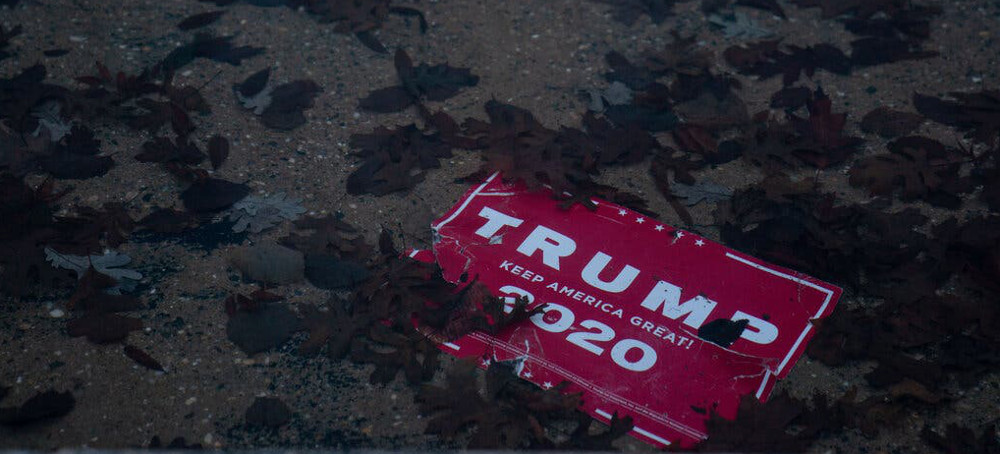 'It is a sick historical joke that the criminalization of politics ran up against the country electing its first criminal president.' (photo: Anna Moneymaker/The New York Times)
'It is a sick historical joke that the criminalization of politics ran up against the country electing its first criminal president.' (photo: Anna Moneymaker/The New York Times)
Two paradoxical forces are bearing down on the city courthouse where the former president will be arraigned. The first is a long-term trend toward the criminalization of politics. A quarter-century ago, conservatives convinced themselves that the rule of law depended on removing Bill Clinton from office simply because a right-wing prosecutor had maneuvered him into denying a sexual affair under oath. Respectable conservatives circulated lurid fantasies of Clinton’s criminality, insinuating that he had been running a corrupt financial scheme, along with possibly a secretive drug operation, and that the suicide of White House aide Vince Foster was actually a murder to cover up Foster’s knowledge of the schemes.
By the time Trump ran for president in 2016, he could lead chants of “Lock her up!” against Hillary Clinton, drawing on decades of belief that imprisonment would be the normal, correct treatment of an opponent. Once in office, he intensified this style, continually depicting almost any political opponent or critic as a legal wrongdoer. He flung charges of criminality at the past four Democratic presidential nominees: Joe Biden, Clinton, Barack Obama, and even John Kerry (for allegedly violating the Logan Act). He has called for prosecuting the likes of Nancy Pelosi, Adam Schiff (for paraphrasing Trump’s Ukraine phone call in a speech), John Bolton (for writing a tell-all book), Joe Scarborough, numerous former FBI officials, and three Obama-era national security officials.
Most of these wild claims drew broad support from within his party. And while his rhetoric mostly failed to yield charges, Trump did succeed in pressuring U.S. Attorney for the Southern District of New York Geoffrey Berman to bring charges against Democratic lawyer Gregory Craig. Trump’s attorney general appointed a special counsel, John Durham, who brought spurious legal cases against several Trump targets.
What made this all so terrifying was not just the authoritarian corruption of legal power but the broader idea that the natural state of U.S. politics was for the winning party to imprison the losers. Democratic systems rely upon the winners exercising forbearance toward the losers.
It is a sick historical joke that the criminalization of politics ran up against the country electing its first criminal president. This is not to say Trump is the first U.S. president to have violated the law. Rather, he is the first to come to his position via the world of crime.
Trump has spent his life surrounded by gangsters. His defiance of the law dates back five decades to the 1970s, when he and his father refused to allow Black tenants to rent Trump-owned apartments and made a mockery of Justice Department efforts to force them to obey nondiscrimination laws. Trump’s niece, Mary Trump, turned over documents to the New York Times proving Trump had systematically engaged in criminal tax fraud (setting up shell companies, siphoning funds) for years. Reporters have produced strong evidence that he routinely misrepresented the value of his assets to lenders and the government in order to enrich himself. His family’s charitable foundation was closed down for its misappropriation of funds. The layman’s term for such activities, in which you break the law in order to have more money, is stealing. While he was in office, an astonishing array of Trump’s confederates were convicted of crimes.
Trump has escaped prosecution owing to a combination of scandalously lax law enforcement against the wealthy, along with a hardened criminal’s instinct for self-protection. He has famously steered clear of communicating in writing and even scolded his lawyers for taking notes in his presence. (His favorite attorney, Roy Cohn, also a mob lawyer, assiduously avoided writing down anything in his presence as well.) Trump has always spoken like a criminal, disparaging cooperating witnesses as “rats” or “flippers,” and he thinks like one, too: There is no moral difference in his mind between the law abiding and the law defying. The only difference is that some people are smart and others are suckers.
And yet: The foundation of any fair legal system is that everybody, even a criminal, has rights. The leaked details of the case against Trump reportedly being brought by Alvin Bragg are underwhelming and border on the negligent. They seem to stitch together a decent misdemeanor case against Trump for falsifying records (his disguising of a payoff to one or potentially two women with whom he had affairs) and could charge the payment as a campaign-finance violation. Unless there is more to Bragg’s case than has been reported, it smells of an effort to find a crime.
The indictment’s details matter tremendously. The sanctity of the rule of law hinges upon applying its force equally, without regard to the standing of the accused. This requirement goes both ways — Trump’s decades of using his power to steal and cheat is one form of corruption of the rule of law that cannot be resolved by locking him up over a charge no other person would likely have faced. Turnabout is not fair play here.
So as the world waits to see what the charges contain, the principle to keep in mind is that what needs to be upheld is not an outcome but a system. That it is a system Trump has devoted his life to discrediting is one of the strange ironies of this moment.
READ MORE 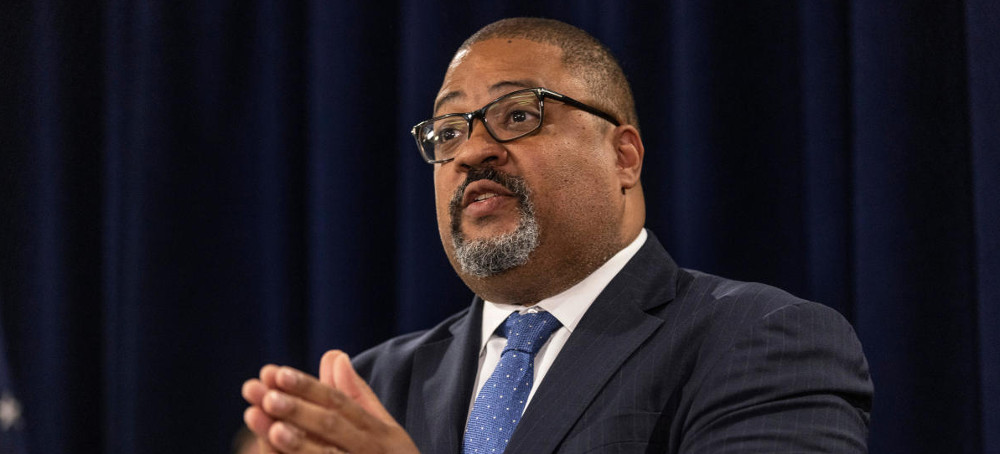 Alvin Bragg, the district attorney who criminally charged Donald Trump, is in the spotlight. (photo: AP)
Alvin Bragg, the district attorney who criminally charged Donald Trump, is in the spotlight. (photo: AP)
The decision by Manhattan District Attorney Alvin Bragg to indict the former president also illustrates the beauty of the federalism underlying our republic’s design. It is, Supreme Court Justice Louis D. Brandeis wrote, an elegant feature of our federal system that “a single courageous State may, if its citizens choose, serve as a laboratory.”
In this case, it is New York serving as the proving ground to establish the accountability of a man who succeeded in becoming president, in considerable measure, by covering up his past. Some understandably worry that his later attempts to overturn the Constitution were far worthier subjects for indictment. While we wait to see whether charges will be filed on those counts, we should keep in mind that, but for Trump’s alleged misconduct just before the 2016 election, the attempted coup of late 2020 and Jan. 6, 2021, might never have occurred.
Moreover, a prosecutor pursues crimes as he finds them. The precise charges are not yet known, but the case has focused on Trump’s alleged $130,000 payoff to adult-film actress Stormy Daniels to keep her quiet on the eve of the 2016 election — so symbolic of his brand: utter defiance of morality and law in pursuit of power and wealth. If those allegations indeed are the basis of Bragg’s charges, and are proved true, the larger victim will have been the public, from whom crucial information was hidden. Having gotten himself elected, Trump spent four years in office — and all the time since — swinging a wrecking ball against the edifice of our constitutional republic.
Protecting the principle that no person is above the law requires constant vigilance, as we have already come perilously close to losing it once. It was damaged nearly 50 years ago, when another modern president committed provable crimes in office.
In 1974, President Richard M. Nixon escaped criminal accountability for his Watergate offenses when his successor, Gerald Ford, pardoned him to “shut and seal” the book on what he had called “our long national nightmare.” In fact, letting the most notorious political criminal of his day escape justice helped set the stage for the nightmare’s return — with a vengeance. Trump’s misconduct in office exceeded Nixon’s, and he came close to plunging our nation into chaos.
In Federalist No. 1, Alexander Hamilton described the greatest danger to the government that he and his co-founders had designed. The threat came, he wrote, from men who “have begun their careers by paying an obsequious court to the people; commencing demagogues and ending tyrants.” No one in 1787 could have foreseen Trump, but history had taught the founders about the type: men of “perverted ambition” who “hope to aggrandize themselves by the confusions of their country.”
Clarity is the antidote to those confusions. It comes when prosecutors enforce legal lines that separate permissible government action from criminal conduct. Law properly applied has always been the most effective instrument of a stable, constitutionally based society.
We have every reason to expect that Justice Department special counsel Jack Smith and Fulton County, Ga., District Attorney Fani Willis will follow Bragg’s lead with indictments of Trump for breaking far more significant rules that outlaw attempts to negate the people’s will by overturning an election. Indeed, now that Bragg has indicted Trump for getting himself elected via one alleged fraud at the front end of his 2016 election, it would be poetic justice should Smith and Willis indict him later for conspiring to defraud the United States and Georgia, respectively, via a fake-elector scheme at the back end.
Some call it a political mistake to indict Trump. Criminal trial risks making him a martyr, they say, energizing his base in the middle of his campaign for the 2024 Republican nomination. Politics, however, is not the business of prosecutors. Their sworn duty is to follow the facts and enforce the law in their jurisdiction when they have the evidence to prove that the law has been violated.
Trump is entitled to the presumption of innocence, and the case against him must still be argued before a jury of his fellow citizens. Indictment is just the beginning, but it sets this chapter in the timeless story of the law.
What history will note and long remember are two things that happened on March 30, 2023. First, that our federal republic demonstrated that one state could indeed serve as a laboratory — here, to establish a precedent of accountability for the powerful. And second, that an undaunted local prosecutor from that state planted the flag of justice firmly on the side of the rule of law.
READ MORE 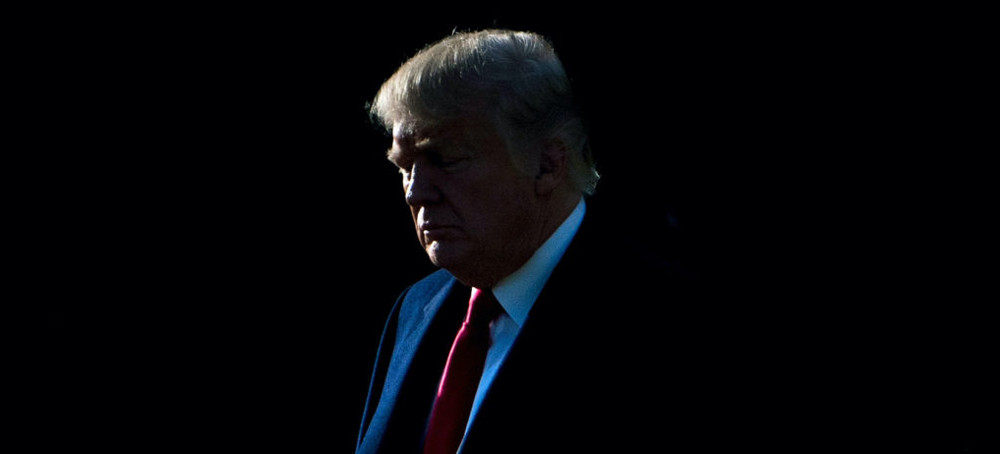 'Donald J. Trump will likely face standard processing when he is taken into custody.' (photo: Reuters)
'Donald J. Trump will likely face standard processing when he is taken into custody.' (photo: Reuters)
ALSO SEE: Trump Can Still Run for President in 2024 After Being Indicted
Donald J. Trump will likely face standard processing when he is taken into custody, but the unprecedented arrest of a former commander in chief will be anything but routine.
If he surrenders Tuesday, Donald J. Trump is expected to walk through the routine steps of felony arrest processing in New York now that a grand jury has indicted him in connection with his role in a hush-money payment to a porn star. But the unprecedented arrest of a former commander in chief will be anything but routine.
Accommodations may be made for Mr. Trump. While it is standard for defendants arrested on felony charges to be handcuffed, it is unclear whether an exception will be made for a former president. Most defendants are cuffed behind their backs, but some white-collar defendants deemed to pose less danger have their hands secured in front of them.
Mr. Trump will almost certainly be accompanied at every step — from the moment he is taken into custody until his appearance before a judge in Lower Manhattan’s imposing Criminal Courts Building — by armed agents of the U.S. Secret Service. They are required by law to protect him at all times.
Security in the courthouse is provided by state court officers, with whom the Secret Service has worked in the past. But the chief spokesman for the federal agency, Anthony J. Guglielmi, said he could not comment on measures that would be put in place for Mr. Trump.
It may take several days for Mr. Trump to appear at the courthouse. Now that the grand jury has voted to indict him — meaning to charge him with felony crimes — the indictment will remain sealed until his expected arraignment on Tuesday, when the charges will be formally revealed.
After the indictment, prosecutors contacted Mr. Trump’s defense lawyers and negotiated the terms of his surrender, a common practice in white-collar investigations.
Lawyers for Mr. Trump, who is running for president a third time, said late Thursday that he will surrender and he is expected to be arraigned on Tuesday.
After he is arraigned, he is almost certain to be released on his own recognizance, because the indictment will likely contain only nonviolent felony charges; under New York law, prosecutors cannot request that a defendant be held on bail in such cases.
The former president is already using the charges as part of a campaign strategy to energize his base.
Surrender is not in the confrontational former president’s DNA, and he often seems to relish antagonizing and attacking prosecutors who have investigated him, such as Alvin L. Bragg, the Manhattan district attorney who secured Thursday’s indictment. He has called Mr. Bragg, who is Black, “a racist” and an “animal” and said that his investigation was politically motivated.
In the unlikely event that the former president refuses to surrender, Gov. Ron DeSantis of Florida has already said that his state “will not assist in an extradition request,” should one come from New York authorities. Still, if the New York prosecutors were to actually seek Mr. Trump’s extradition, and Mr. DeSantis attempted to protect his Republican rival, he could possibly face legal action himself.
READ MORE 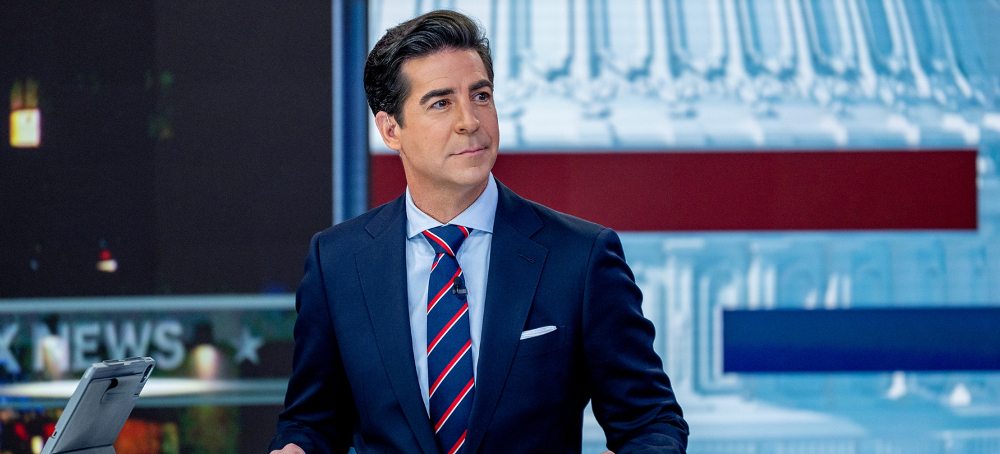 Fox News host Jesse Watters. (photo: Fox News)
Fox News host Jesse Watters. (photo: Fox News)
ALSO SEE: Trump Uses His Indictment to Unify GOP, Even as His Vulnerabilities Are Glaring
The conservative network's hosts scrambled to defend the former president's hush money payments to Stormy Daniels — and even got into it with each other
Gasps could be heard around the set of The Five as the news broke, and anchors lashed out at Prosecutor Alvin Bragg — and in some cases their co-hosts, while reacting to the news.
Host Jesse Watters — keying off the case likely revolving around a hush money payment to Stormy Daniels — railed that there’s no criminality in paying off one’s former lovers. (The legal issue at hand isn’t that Trump paid her, it’s whether the manner of payment ran afoul of New York law and federal election law.
“If you get a haircut a couple of weeks before the election and you pay for it out of your own pocket, not campaign funds, how is that a campaign finance felony?” Watters said. “You’re going to get a haircut anyway. You wanted to look good anyway. Just like he would have paid off this woman anyway, whether he was running for president or not.”
“You think a public affair with a porn star is the same as getting a touch-up on your hair?” countered host Jessica Tarlov.
Later in the show, Watters complained that “Democrats” just indicted Trump “over sex.”
“We were told during the 90s that it was just sex, and it was just a private deal and it had nothing to do with politics, nothing to do with policy. Weren’t we told that?” Watters was referencing the Clinton-Lewinsky scandal. He did not note that former president Bill Clinton was impeached over his sexual relationship with White House intern Monica Lewinsky.
Fellow host Greg Gutfeld had choice words for Bragg, calling him an “incompetent boob,” and asserting that the charges against Trump would elevate him to “folk hero” status. “Basically it’s one party hunting another,” said Gutfeld. “He’s going to be a political prisoner getting prosecuted over politics.”
While the network had reportedly implemented a “soft ban” on Trump appearances in recent months, the former president made his return to Fox News earlier this week in an extended interview with host Sean Hannity. Now that Trump and Fox have begun to make amends, the president can take full advantage of the network’s willingness to defend him, no matter the cost.
Follow us on facebook and twitter!
PO Box 2043 / Citrus Heights, CA 95611


No comments:
Post a Comment
Note: Only a member of this blog may post a comment.